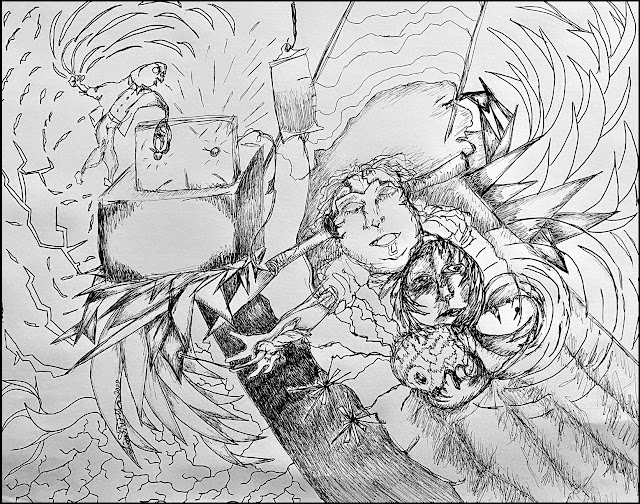ECT: What I Found Out
ECT (electroconvulsive therapy) is a hotly debated
psychiatric treatment, but beyond that, what are the parts of the procedure and
effects on patients after that aren’t brought into the light? I’ve undergone
ECT, so I come from a place of lived experience. I wrote this poem, slightly
snarky in tone, but it does explain what happens, what ECT is about, in a better
way than me writing straightforward text.
Safe! Effective! (*no guarantee)
Wheel you in on a stretcher bed
Electrodes stuck about your head
The IV’s in, soon you’ll be out
Can’t bite your tongue with this shoved in your mouth
Cuz you will seize, in a grand mal way
Succinyl keeping bone-breaking at bay
Breathe deep, count backwards really slow
Patient’s out and we’re ready to go
Knobs turn, amps up, each wire packed
Hit the brain from front to back
But you don’t know, just wake up later
Rolled into an elevator
Nurse asks how you’re feeling now
Don’t know, I’m in this room somehow
Weeks later, six more of these thrust on you
They say you’re better; they see it, it’s true!
Go on home but come back soon, fast
Without maintenance ECT this shit won’t last.
This series of tweets I wrote in reply to someone else illustrates the long-term effect ECT had on me. It’s not that I ended up with permanent brain or central nervous system damage, but I did feel coerced in agreeing to treatment, violated, and wondering why psychiatrists went right to ECT instead of reviewing the amount and combination of meds I was prescribed.
You're a patient, on a psych unit, on too many meds, written off as hopeless, but! we can offer you ECT, you should, you should, harp the psychiatrists. You give in, but it's just more trauma
and you tell psychiatrist it helped some, but don't mean it. Go home. Can't find things there, kitchen stuff, confusing, but the flatness oddly comforts. Do your maintenance ECT. Years later you look back, an impression of fluorescent lights flashing on, off, but in your head.
The ECT didn't physically hurt, didn't erase identity. But it chipped at your dignity and humanity around yourself. You feel like you experimented on your own head. You feel like you let someone hit you in the head, over and over and it was okay. The violation stays imprinted.
ECT shouldn't have been offered to me. The manner in which I was being overmedicated, repeated psych hospitalizations, was my true trauma ever addressed? - those should've been investigated/overhauled. I got ECT because that hospital 1) had it 2) used it a lot and 3) used it as first line treatment.
I bring this up because I've seen many patients in this same position. Psychiatrists are under insurance/time/too many patients restraints. Nobody has resources (desire?) to take a chronic, long-time patient's treatment apart and explore doing it better. And the patient is too numb to take charge.
And then if you're in hospital equipped to give ECT, the option to try ECT over a deep look into how you've been handled over years, well, it's easier. So, I'm speaking to a particular circumstance I found myself in, my experience, that in talking to other ECT patients, I discovered was theirs too.
It's a hard part to assess, for yourself, until you've stepped away for a long time. Difficult to describe and have others realize. I do hope that clinicians can become more mindful of these kinds of subtle, or not so subtle, harms that ECT inflicts on patients.
I’m not completely condemning ECT, but it should be a choice made with true, full information for patients about what physically happens during the procedure and offered only after careful evaluation of how that person has been treated in the past, is being treated now, and if sorting that out might improve their condition rather than a potentially negatively life-changing treatment.





Comments